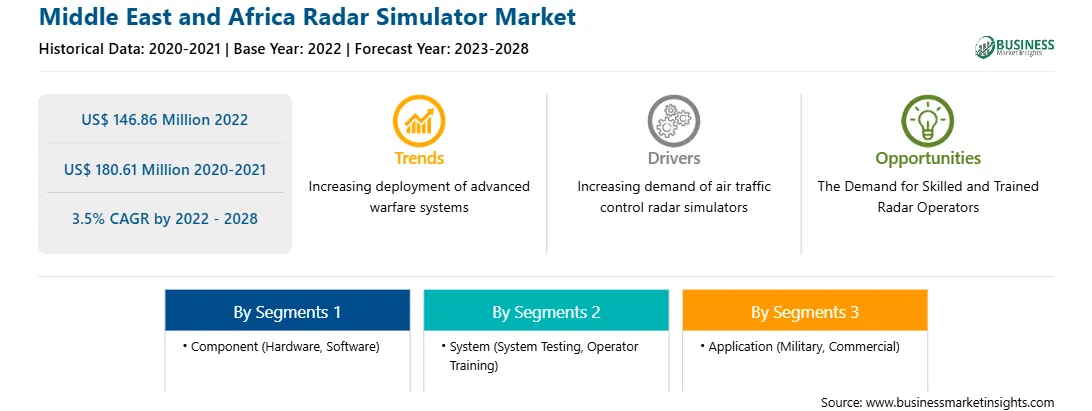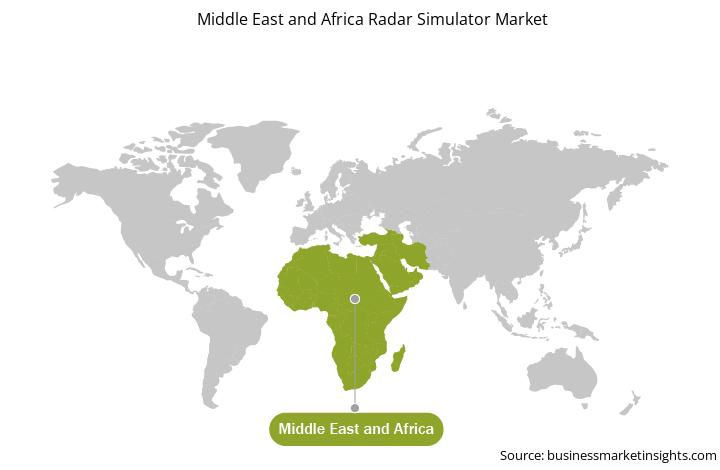The radar simulator market in the Middle East & Africa is expected to grow from US$ 146.86 million in 2022 to US$ 180.61 million by 2028; it is estimated to grow at a CAGR of 3.5% from 2022 to 2028.
The military & aerospace industry has seen rapid growth over the last decade, and this trend is expected to continue. The increase in investments in modern aircraft fleets by governments, coupled with several other socio-economic factors, has fueled the growth of air traffic control, which ultimately boosted the demand for radar simulators across the region. Air transport plays a critical role in a country’s economic growth. The majority of the governments are emphasizing heavily on the growth of airports in order to catalyze respective aviation sectors. Owing to this, a large number of airports are being constructed or renovated (air traffic control towers, runways, terminals, and others). The development/renovation of air traffic control towers is allowing the radar simulator market players to experience higher demand. The growing modernization of aircraft and radar systems has driven the need for advances in conventional radar simulators. Airline operators and air traffic control officers demand accurate, real-time radar information that helps pilots and operators to make accurate decisions. Radar simulators are being installed in airports and training centers across all the major airports, which is driving their demand. For instance, in February 2019, the Qatar Civil Aviation Authority (QCAA) signed a contract with Micro Nav to design and deliver a 3D air traffic control tower simulator for Hamad International airport. Moreover, radar simulators enhance the efficiency of air traffic control operations and consequently offer greater and more precise testing of radar systems and accurate training of operators. Thus, this rising demand for air traffic control radar simulators from airline and airport authorities is driving the radar simulator market.
Strategic insights for the Middle East and Africa Radar Simulator provides data-driven analysis of the industry landscape, including current trends, key players, and regional nuances. These insights offer actionable recommendations, enabling readers to differentiate themselves from competitors by identifying untapped segments or developing unique value propositions. Leveraging data analytics, these insights help industry players anticipate the market shifts, whether investors, manufacturers, or other stakeholders. A future-oriented perspective is essential, helping stakeholders anticipate market shifts and position themselves for long-term success in this dynamic region. Ultimately, effective strategic insights empower readers to make informed decisions that drive profitability and achieve their business objectives within the market. The geographic scope of the Middle East and Africa Radar Simulator refers to the specific areas in which a business operates and competes. Understanding local distinctions, such as diverse consumer preferences (e.g., demand for specific plug types or battery backup durations), varying economic conditions, and regulatory environments, is crucial for tailoring strategies to specific markets. Businesses can expand their reach by identifying underserved areas or adapting their offerings to meet local demands. A clear market focus allows for more effective resource allocation, targeted marketing campaigns, and better positioning against local competitors, ultimately driving growth in those targeted areas.Middle East and Africa Radar Simulator Strategic Insights

Middle East and Africa Radar Simulator Report Scope
Report Attribute
Details
Market size in 2022
US$ 146.86 Million
Market Size by 2028
US$ 180.61 Million
Global CAGR (2022 - 2028)
3.5%
Historical Data
2020-2021
Forecast period
2023-2028
Segments Covered
By Component
By System
By Application
Regions and Countries Covered
Middle East and Africa
Market leaders and key company profiles
Middle East and Africa Radar Simulator Regional Insights

The Middle East & Africa radar simulator market is segmented based on component, system, application, and country. Based on component, the market has been segmented into hardware and software. The hardware segment would dominate the Middle East & Africa radar simulator market in 2022. In terms of system, the market is divided into system testing and operator training. The operator training segment would dominate the Middle East & Africa radar simulator market in 2022. Based on application, the market has been bifurcated into military and commercial. The commercial segment dominated the Middle East & Africa radar simulator market in 2022. Based on country, The Middle East & Africa radar simulator market is segmented into South Africa, Saudi Arabia, the UAE, and the Rest of Middle East & Africa. The Rest of Middle East & Africa would dominate the market in 2022.
Key players operating in the Middle East & Africa radar simulator market include Adacel Technologies Limited; Collins Aerospace; L3Harris Technologies, Inc.; Micro Nav Limited; and Ultra Electronics Inc.
The Middle East and Africa Radar Simulator Market is valued at US$ 146.86 Million in 2022, it is projected to reach US$ 180.61 Million by 2028.
As per our report Middle East and Africa Radar Simulator Market, the market size is valued at US$ 146.86 Million in 2022, projecting it to reach US$ 180.61 Million by 2028. This translates to a CAGR of approximately 3.5% during the forecast period.
The Middle East and Africa Radar Simulator Market report typically cover these key segments-
The historic period, base year, and forecast period can vary slightly depending on the specific market research report. However, for the Middle East and Africa Radar Simulator Market report:
The Middle East and Africa Radar Simulator Market is populated by several key players, each contributing to its growth and innovation. Some of the major players include:
The Middle East and Africa Radar Simulator Market report is valuable for diverse stakeholders, including:
Essentially, anyone involved in or considering involvement in the Middle East and Africa Radar Simulator Market value chain can benefit from the information contained in a comprehensive market report.